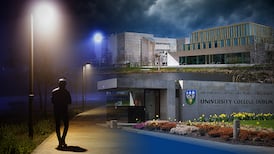THE Archbishop of Dublin, Dr Connell, has said proposals put forward by the Constitution Review Group for the funding of Catholic hospitals would lead to the imposition of "penal conditions" that would "rapidly cause their destruction
Addressing the Mater Hospital's a.g.m. yesterday, Dr Connell quoted the review group as asking the following question in its commentary on Article 44 of the Constitution: "Is it permissible for a publicly funded hospital to decline, for what amounts to religious reasons, to perform what is a lawful operation?" Dr Connell responded: "On the answer to this question will depend the survival of Catholic hospitals."
The archbishop said that for the review group - whose report was published in July - it was a "fundamental consideration" that certain reproductive medical procedures accorded with the law. It is understood he was referring to procedures such as sterilisation and in-vitro fertilisation.
Dr Connell went on: "But unless one accepts that whatever the law permits is morally acceptable, one has to ask by what right the law could impose what a hospital would regard as immoral as a condition of the support it is entitled to expect."
"Surely there is something anomalous about a constitutional provision that would oblige the State to impose the kind of penal conditions on the funding of Catholic hospitals that would rapidly cause their destruction.
"With our memory of centuries of unjust discrimination against our faith, we might in that case be pardoned for thinking that the more we change the more we find ourselves where we were."
Dr Connell said he regretted the review group had confined itself to the example of sterilisation to illustrate the issue.
"Examples of procedures that would be even more objectionable to a Catholic hospital were declared to be `lawful operations' by recent judgments of the Supreme Court," he said, in a reference to the court's rulings on the X case abortion information and removing a feeding tube from a woman in a long-term coma.
He said it would be "rash to deny continuity between the procedures permitted by Supreme Court decisions and the road already travelled in Britain".
"Moral issues are also raised by aspects of reproductive technology already practised in Ireland. If the law should give its approval to procedures that a Catholic hospital must regard as immoral, is it to lose the funding it receives from the State? Is it to be secularised?"
Dr Connell said that in its report a majority of the review group considered that Article 44 of the Constitution should be amended "to provide that institutions which retain a religious ethos should not be debarred from public funding, provided that they do not discriminate on grounds of religious practice or belief, save where this can be shown, in any given case, to be necessary to maintain its own religious ethos".
He said there was no suggested text for this proposed amendment. He stressed that, although the review group had said institutions with a religious ethos should not be debarred from public funding, "there is nothing in this form of recommendation to prevent the State from starving voluntary institutions of funds".
He said the recommendation's final phrase about citing the necessity to maintain a religious ethos "imposes a test which is far from clear. The recommendation is haunted by a spectre of unjust discrimination on the part of religious bodies; consequently it is negative and grudging in style."
He concluded that it expressed "a truly extraordinary attitude" to hospitals with a religious ethos to which the review group acknowledged the State was greatly indebted.









